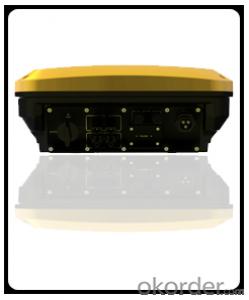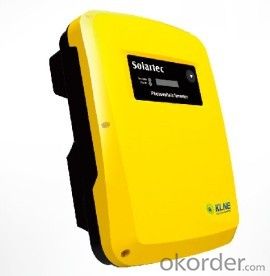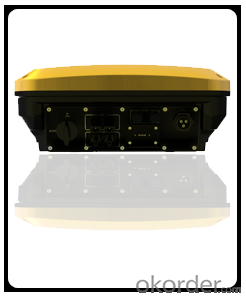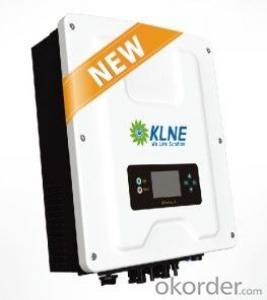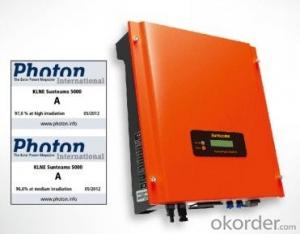Solartec 4000 KLNE on grid inverter with WIFI
- Loading Port:
- Shanghai
- Payment Terms:
- TT OR LC
- Min Order Qty:
- -
- Supply Capability:
- 10000 set/month
OKorder Service Pledge
Quality Product, Order Online Tracking, Timely Delivery
OKorder Financial Service
Credit Rating, Credit Services, Credit Purchasing
You Might Also Like
Solartec 1500,2000,2500,3000,3600,4000,4600,5000
1MPPT, single phase
IP 65
New mold with Pure thick aluminum crust.
Efficient
■ Efficiency of up to 97.6 %
■ TransformerlessSafe
■ Integrated DC switch
■ Comprehensive protection functionsFlexible
■ LCD backlight
■ For indoor and outdoor installationSimple
■ ‘Plug and play’connection for easy installation
■ Friendly interface, easy to install and maintain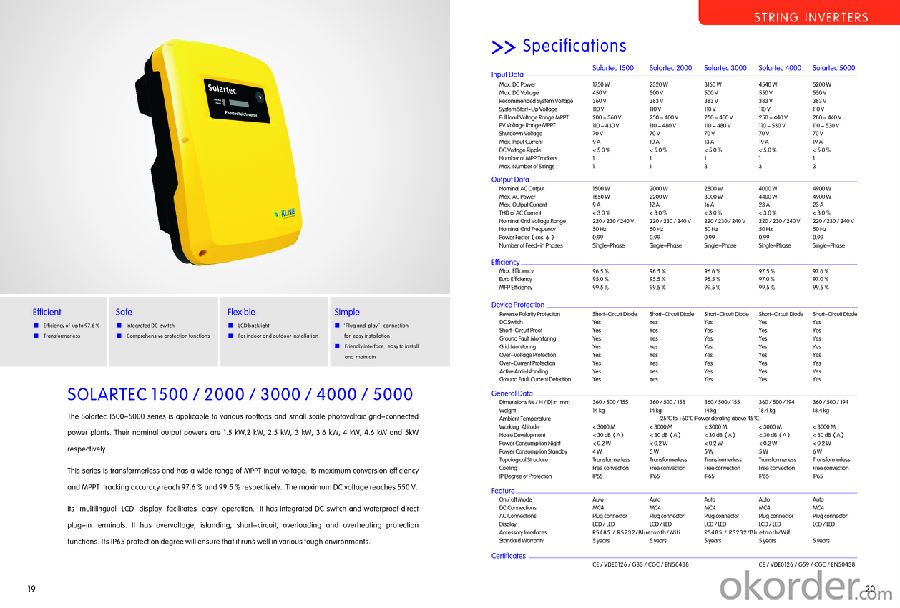
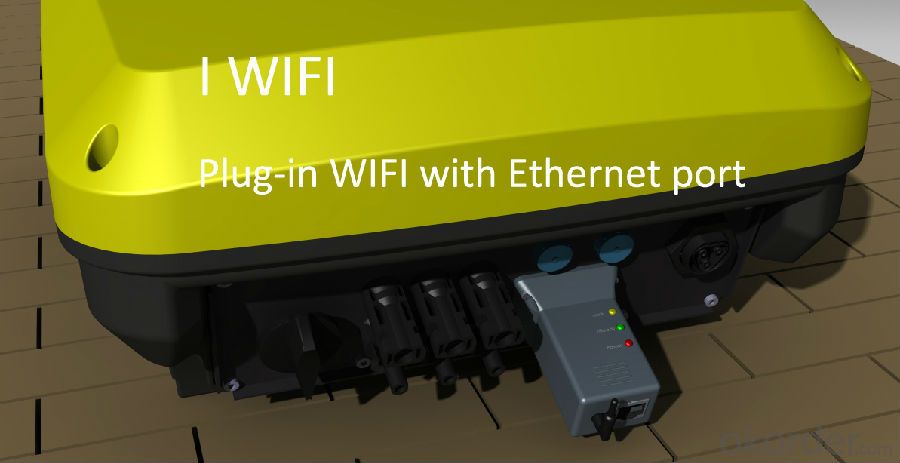
- Q: Can a solar inverter be used in areas with high levels of electrical noise or interference?
- Yes, a solar inverter can be used in areas with high levels of electrical noise or interference. However, it is important to ensure that the solar inverter is designed and equipped to handle such conditions. Some modern solar inverters have built-in features and technologies that help mitigate electrical noise and interference. These features may include advanced filtering, shielding, and surge protection mechanisms. Additionally, proper grounding and installation practices can also help reduce the impact of electrical noise and interference on the performance of the solar inverter. It is advisable to consult with a professional or the manufacturer of the solar inverter to ensure compatibility and optimal performance in high-noise environments.
- Q: How does a solar inverter handle voltage dips or fluctuations in the grid?
- A solar inverter handles voltage dips or fluctuations in the grid by constantly monitoring the grid voltage. When it detects a dip or fluctuation, it rapidly adjusts its output voltage to stabilize the grid voltage. This process is known as grid support or grid-tied operation and ensures that the solar inverter maintains a steady and synchronized connection with the grid, even during voltage disturbances.
- Q: What is the role of a frequency regulation feature in a solar inverter?
- The role of a frequency regulation feature in a solar inverter is to ensure that the power output from the solar panels matches the grid's frequency and voltage requirements. It helps maintain a stable and consistent frequency, allowing for seamless integration of solar power into the existing electrical grid.
- Q: How do you choose the right size solar inverter for your system?
- To choose the right size solar inverter for your system, you need to consider the total power output of your solar panels and the maximum power rating of the inverter. It is important to match the inverter's capacity with the maximum power output of your solar panels to ensure optimal performance and efficiency. Additionally, factors such as the type of system (off-grid or grid-tied) and future expansion plans should also be taken into account when determining the appropriate size of the solar inverter for your system.
- Q: How does a solar inverter handle voltage harmonics?
- A solar inverter handles voltage harmonics by using filtering techniques and advanced control algorithms. These methods help to smooth out the output voltage waveform, reducing or eliminating any unwanted harmonics.
- Q: What is the role of a solar inverter in reactive power compensation?
- The role of a solar inverter in reactive power compensation is to monitor and regulate the reactive power flow in the electrical system. It helps maintain a power factor closer to unity by injecting or absorbing reactive power as needed. This is crucial for improving the overall efficiency and stability of the grid, as well as reducing voltage fluctuations and line losses.
- Q: How does a solar inverter handle voltage drop in long cable runs?
- A solar inverter handles voltage drop in long cable runs by compensating for the drop in voltage through a process called voltage regulation. It adjusts the output voltage to ensure that the required voltage level is maintained at the point of connection to the solar panels. This allows for efficient power transmission and ensures that the system operates optimally despite the voltage drop caused by long cable runs.
- Q: How does a solar inverter handle low light conditions or cloudy days?
- A solar inverter handles low light conditions or cloudy days by continuously monitoring the incoming solar energy. When there is a decrease in sunlight, the inverter adjusts its voltage and current output to optimize the power conversion. This ensures that even under low light conditions, the inverter can still convert the available solar energy into usable electricity efficiently.
- Q: Can a solar inverter be used with smart home systems?
- Yes, a solar inverter can be used with smart home systems. Smart home systems are designed to integrate and control various devices, including solar inverters, to optimize energy usage and manage power generation. By connecting a solar inverter to a smart home system, users can monitor and control their solar power production, track energy consumption, and even automate energy-saving actions based on real-time data. This integration enhances the efficiency and functionality of both the solar inverter and the smart home system.
- Q: Can a solar inverter be used with different types of solar PV systems (roof-mounted, ground-mounted, etc.)?
- Yes, a solar inverter can be used with different types of solar PV systems, including roof-mounted, ground-mounted, and other variations. The primary function of a solar inverter is to convert the direct current (DC) electricity generated by solar panels into alternating current (AC) electricity that can be used to power appliances and feed into the electrical grid. This conversion process remains consistent regardless of the type of PV system being used. However, it's important to note that the specific requirements and specifications of the solar inverter may vary depending on the type of PV system. Different PV systems may have varying voltage and power outputs, which may require specific inverter models capable of handling those specific requirements. For example, ground-mounted solar systems may have larger arrays and higher power outputs compared to roof-mounted systems, necessitating a different inverter. Therefore, while a solar inverter can generally be used with different types of solar PV systems, it is crucial to choose an inverter that is compatible with the specific system's voltage, power output, and other technical specifications. It is always recommended to consult with a professional solar installer or technician to ensure the proper selection and installation of the solar inverter for your specific PV system.
Send your message to us
Solartec 4000 KLNE on grid inverter with WIFI
- Loading Port:
- Shanghai
- Payment Terms:
- TT OR LC
- Min Order Qty:
- -
- Supply Capability:
- 10000 set/month
OKorder Service Pledge
Quality Product, Order Online Tracking, Timely Delivery
OKorder Financial Service
Credit Rating, Credit Services, Credit Purchasing
Similar products
Hot products
Hot Searches
Related keywords

